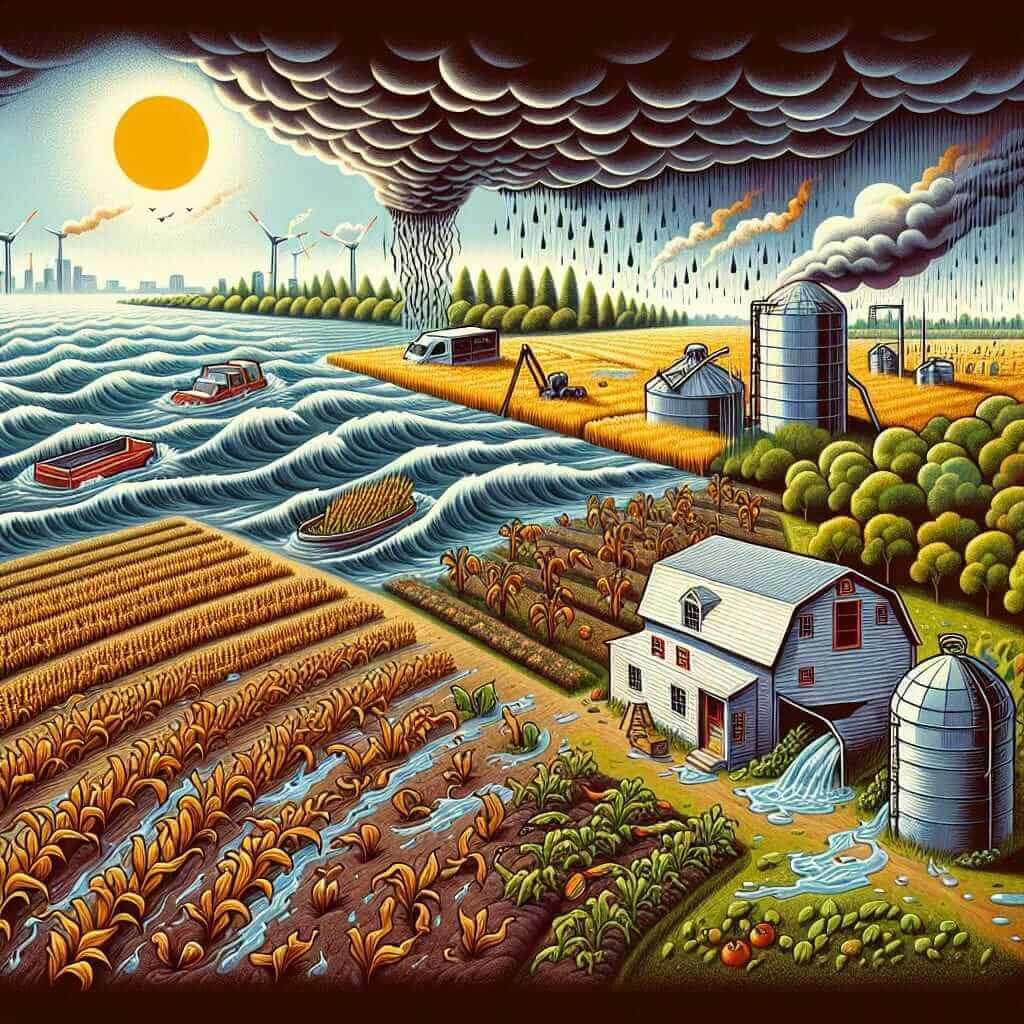The IELTS Reading section can be quite challenging, especially when it comes to topics that require understanding complex scientific ideas. One such popular topic that often appears in the IELTS Reading section is the Consequences of Climate Change on Global Agriculture. This article aims to provide a comprehensive reading passage along with questions and a detailed answer key to help you practice and excel in this topic. Historically, climate change and its effects on agriculture have been recurrent themes in the IELTS exams, and it is likely to appear in future IELTS tests due to its ongoing relevance.
Practice Reading Passage on the Consequences of Climate Change on Global Agriculture (Medium Text)
Climate change poses numerous threats to global agriculture, affecting both the quantity and quality of food production. One of the most significant impacts is the alteration of weather patterns, which can lead to unpredictable growing seasons and extreme weather events such as droughts, floods, and storms. These changes disrupt the delicate balance required for successful crop cultivation and can result in substantial losses for farmers.

Furthermore, rising temperatures contribute to increased evaporation rates, which reduces soil moisture and exacerbates water scarcity issues. In regions heavily dependent on rain-fed agriculture, this can severely limit crop growth and yield. On the other hand, higher temperatures can expand the habitable zones for certain crops, allowing them to be grown in previously unsuitable areas. However, this benefit is often outweighed by the adversities brought on by extreme weather conditions.
Another major consequence of climate change is its impact on pest and disease prevalence. Warmer climates are more conducive to the proliferation of pests and pathogens, resulting in increased crop damage and loss. The spread of invasive species is also facilitated, further threatening native crops. Consequently, farmers may have to invest more in pesticides and other control measures, increasing production costs and impacting food prices.
In addition, climate change influences the nutrient composition of both soil and crops. Elevated levels of carbon dioxide (CO2) can affect plant metabolism, leading to reduced nutritional quality of staple crops such as wheat, rice, and maize. This has significant implications for global food security, as it can exacerbate malnutrition, particularly in already vulnerable populations.
Moreover, climate change affects livestock production by altering pasture yields and increasing the incidence of heat stress in animals. Heat stress can reduce livestock productivity and fertility, as well as increase susceptibility to diseases. Farmers may need to invest in cooling infrastructure and alternative feed sources to mitigate these effects, further raising production costs.
In conclusion, the consequences of climate change on global agriculture are multifaceted and far-reaching. From altered weather patterns to increased pest prevalence and changes in crop nutritional quality, the impacts present significant challenges to food production and security. Addressing these challenges requires coordinated efforts at local, national, and global levels, including the adoption of sustainable agricultural practices and investment in research and technology to build resilience in agricultural systems.
IELTS Reading Practice Questions
Questions 1-5
Complete the sentences below with words taken from the reading passage. Use NO MORE THAN THREE WORDS.
- Climate change can lead to ___ which disrupt the balance required for successful crop cultivation.
- Rising temperatures increase ___, exacerbating water scarcity issues.
- The spread of ___ further threatens native crops and increases production costs.
- Elevated CO2 levels can affect plant metabolism, leading to ___ of staple crops.
- Heat stress can reduce livestock ___ and increase their susceptibility to diseases.
Questions 6-10
Do the following statements agree with the information given in the reading passage? Write TRUE, FALSE, or NOT GIVEN.
- Climate change only has negative impacts on global agriculture.
- Higher temperatures can make it possible to grow new crops in previously unsuitable areas.
- Pesticide use is expected to decrease as climate change continues.
- Climate change has a uniform impact on crop quality across different regions.
- Investments in cooling infrastructure are necessary to address heat stress in livestock.
Answer Key
Answers to Questions 1-5
- unpredictable growing seasons
- evaporation rates
- invasive species
- reduced nutritional quality
- productivity and fertility
Answers to Questions 6-10
- FALSE
- TRUE
- FALSE
- NOT GIVEN
- TRUE
Common Mistakes to Avoid
- Misinterpretation of Keywords: Often, students misconstrue keywords in the texts, leading to incorrect answers. Always ensure you fully understand the context.
- Skimming Too Quickly: While skimming is useful, failing to read critical sections in detail can result in missing essential details.
- Confusing ‘True,’ ‘False,’ and ‘Not Given’: Understand that ‘True’ means the sentence aligns with the text, ‘False’ means it contradicts the text, and ‘Not Given’ implies the text does not address the statement.
Vocabulary Focus
- Proliferation (noun) – /prəˌlɪfəˈreɪʃən/ – Rapid increase in numbers.
- Exacerbate (verb) – /ɪɡˈzæsərˌbeɪt/ – Make (a problem, bad situation, or negative feeling) worse.
- Nutritional Quality (noun phrase) – /nuˈtrɪʃənəl ˈkwɑːlɪti/ – The nutrient content and health benefits of food.
- Susceptibility (noun) – /səˌsɛptəˈbɪlɪti/ – Likelihood to be influenced or harmed by a particular thing.
Grammar Focus
- Relative Clauses:
- Form: [Relative Pronoun] + [Subject + Verb]
- Example: “Climate change, which affects global agriculture, is a critical issue.”
- Passive Voice:
- Form: [Subject] + [Form of “be”] + [Past Participle]
- Example: “The delicate balance required for successful crop cultivation is disrupted by climate change.”
Tips for High IELTS Reading Scores
- Expand Your Vocabulary: Broaden your reading materials to include various subjects, especially scientific articles.
- Practice Regularly: Consistent practice will help improve your speed and accuracy.
- Understand the Question Types: Familiarize yourself with different types of IELTS Reading questions to tackle each effectively.
- Don’t Overlook Instructions: Always read and follow the instructions carefully to avoid losing marks unnecessarily.